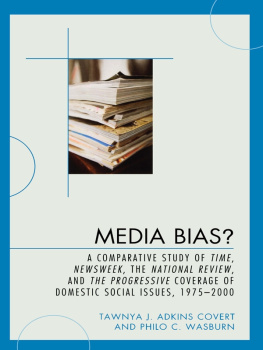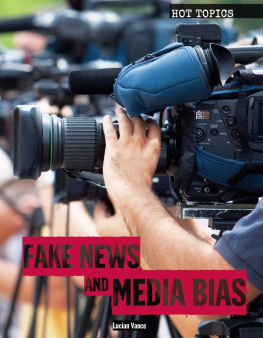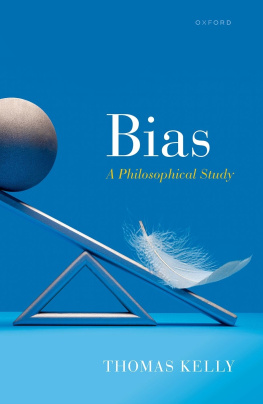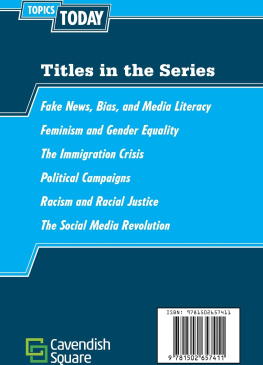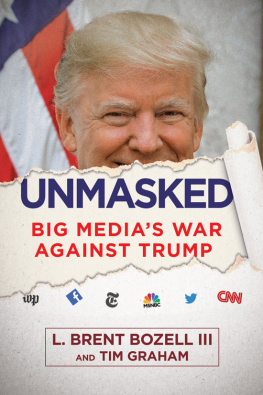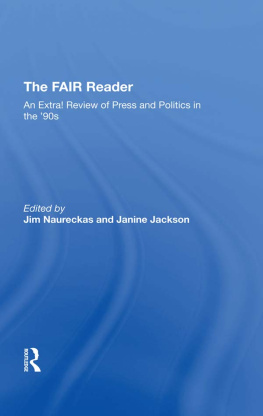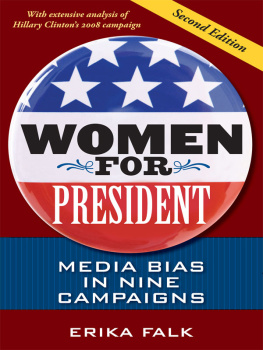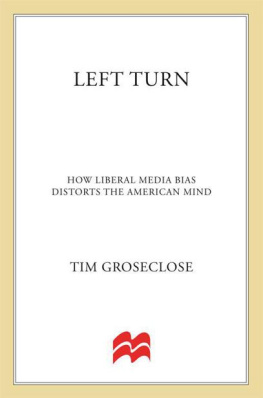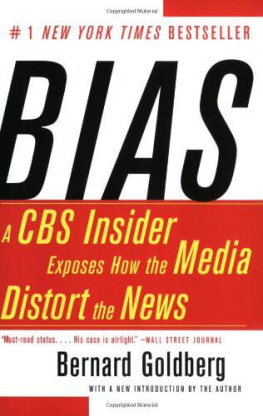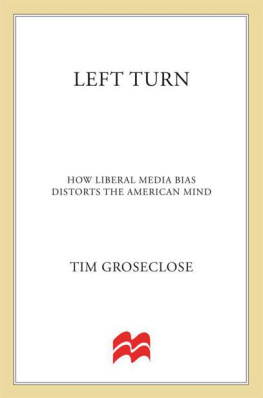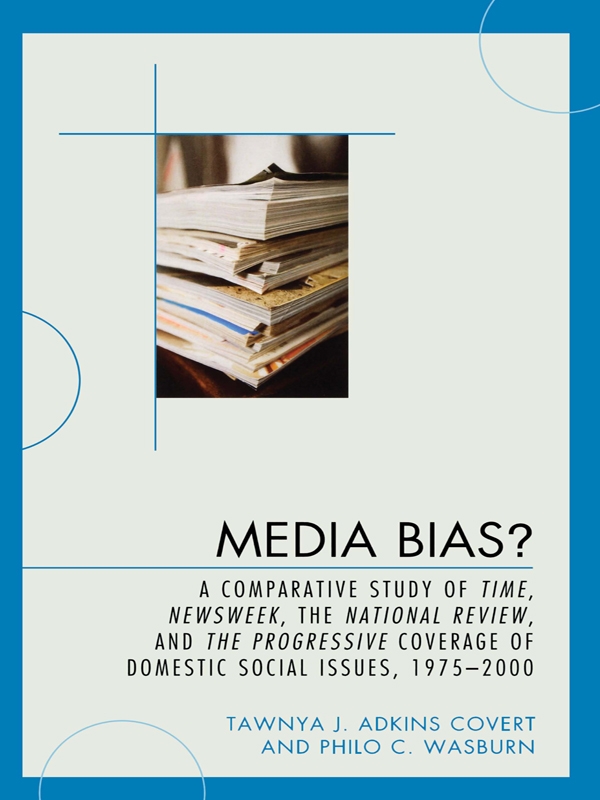Tawnya J. Adkins Covert is associate professor of sociology at Western Illinois University. She holds a PhD and MS in Sociology from Purdue University and BA in sociology from Marshall University. Her research has been published in journals such as Mass Communication and Society, The Sociological Quarterly, Social Science Quarterly, and Journal of Consumer Culture.
Philo C. Wasburn is professor of sociology at Purdue University. He holds a PhD in sociology from Cornell University, and an MA and BA in philosophy from the University of Michigan. He is the author of Political Sociology: Approaches, Concepts, Hypotheses; Broadcasting Propaganda: International Radio Broadcasting and the Construction of Political Reality; and The Social Construction of International News.
Bibliography
Alterman, Eric. What Liberal Media? The Truth about Bias and the News . New York: Basic Books, 2003.
Alvarez, R. Michael, and Jonathan Nagler. Economies, Issues and the Perot Candidacy: Voter Choice in the 1992 Presidential Election. American Journal of Political Science 39, no. 3 (August 1995): 714-744.
Annin, Peter, and Sharon Begly. Great Lake Effect. Newsweek (July 5, 1999): 52-54.
Ashley, Laura, and Beth Olson. Constructing Reality: Print Medias Framing of the Womens Movement, 1966 to 1986. Journalism & Mass Communications Quarterly 75, no. 2 (Summer 1998): 263-277.
Atwater, Tony. Network Evening News Coverage of the TWA Hostage Crisis. Journalism Quarterly 64, no. 2 (Summer/Autumn 1987): 520-525.
Bagdikian, Ben H. The Media Monopoly. Boston: Beacon Press, 1992.
. The Media Monopoly. Boston: Beacon Press, 2000.
Baldastry, Gerald. The Commercialization of News in the Nineteenth Century. Madison: University of Wisconsin Press, 1992.
Barnes, Samuel, and Max Kaase. Political Action: Mass Participation in Five Western Democracies. Beverly Hills, CA: Sage, 1979.
Barstow, David, and Robin Stein. Is It News or Public Relations? Under Bush, Lines are Blurry. The New York Times (March 13, 2005): A1, A18-19.
Beck, Paul A. Voters Intermediation Environments in the 1988 Presidential Contest. Public Opinion Quarterly 55, no. 3 (Fall 1991): 371-394.
Beckett, Katherine. Media Depictions of Drug Abuse: The Impact of Official Sources. Research in Political Sociology 7 (1995): 161-182.
Bennett, Stephen E., Staci L. Rhine, and Richard S. Flickinger. Assessing Americans Opinions about the News Medias Fairness in 1996 and 1998. Political Communication 18, no. 2 (April-June 2001):163-182.
Bennett, W. Lance. News: The Politics of Illusion. 5th Edition. New York: Longman, 2003.
. Gate Keeping and Press-Government Relations: A Multigated Model. P. 285 in Handbook of Political Communication Research, edited by Linda L. Kaid. Mahwah, NJ: Lawrence Erlbaum Associates, Inc., 2004.
Bennett, W. Lance, and Robert M. Entman. Mediated Politics. Pp. 1-32 in Mediated Politics: Communication in the Future of Democracy, edited by W. Lance Bennett and Robert M. Entman. Cambridge, England: Cambridge University Press, 2001.
Berelson, Bernard, Paul Lazarsfeld, and William McPhee. Voting. Chicago: University of Chicago Press, 1954.
Berryhill, Dale A. The Media Hates Conservatives: How It Controls the Flow of Information. Lafayette, LA: Huntington House Publishers, 1994.
Bethell, Tom. They Had a Dream: The Politics of Welfare Reform. National Review (August 23, 2003): 33.
Bozell, L. Brent, III. Weapons of Mass Distortion: The Coming Meltdown of the Liberal Media. New York: Three Rivers Press, 2005.
Bozell, L. Brent, III, and Brent H. Baker, eds. And Thats the Way It Isnt: A Reference Guide to Media Bias . Alexandria, VA: Media Research Center, 1990.
Brady, David W. and Jonathan Ma. Newspapers Labeling of Politicians Reveals a Liberal Bias. Pp. 13-16 in Media Bias , edited by Stuart Kallen. San Diego: Greenhaven Press, 2004.
Brophy-Baermann, Michelle, and Andrew J. Bloeser. Stealthy Wealth: The Untold Story of Welfare Privatization. Harvard International Journal of Press/Politics 11, no. 3 (2006): 89-112.
Brown, Robin. Clausewitz in the Age of CNN: Rethinking the Military-Media Relationship. Pp. 43-58 in Framing Terrorism: The News Media, the Government and the Public , edited by Pipa Norris, Montague Kern, and Marion R. Just. New York: Routledge, 2003.
Buchanan, Pat. The Media Have a Liberal Bias. In Media Bias, edited by Stuart Kallen, 10-13. San Diego: Greenhaven Press, 2004.
Buckley, William H., Jr. God and Man at Yale. Chicago: Regnery, 1951.
Buckley, William H., Jr., and Brent Bozell. McCarthy and His Enemies. Chicago: Regnery, 1954.
Capella, Joseph N, and Kathleen H. Jamieson. Spiral of Cynicism: The Press and the Public Good. New York: Oxford University Press, 1997.
Chibnall, Steven. Law and Order News. London: Tavistock, 1974.
Cirino, Robert. Dont Blame the People: How the News Media Use Bias, Distortion, and Censorship to Manipulate Public Opinion. Los Angeles: Diversity Press, 1971.
Cocks, Jay. How Long Till Equality? Time (July 12, 1982): 29.
Coffey, Philip J. A Quantitative Measure of Bias in Reporting of Political News. Journalism Quarterly 75, no. 3 (Autumn 1975): 551-553.
Cohen, Adam, and Hilary Hylton. Who Should Still Be on Welfare? Time (August 16, 1999): 22-28.
Coleman, James W., and Donald R. Cressey. Social Problems. 3rd edition. New York: Harper & Row, 1990.
Columbia Journalism Review. Who Owns What? http://www.cjr/resourees/ (accessed October 9, 2006).
Conniff, Ruth. Cutting the Lifeline, The Real Welfare Fraud. The Progressive (February 1992): 25-31.
Coulter, Ann. Slander: Liberal Lies about the American Right. New York: Crown Publishers, 2002.
Craig, Robert L. Business Advertising and the Social Control of News. Journal of Communication Inquiry 28, no. 3 (July 2004): 233-252.
Croteau, David. Challenging the Liberal Media Claim. Extra July/August 1998, 4-5.
Croteau, David, and William Hoynes. By Invitation Only: How the Media Limit Political Debates. Monroe, ME: Common Courage Press, 1994.
. The Business of Media: Corporate Media and the Public Interest. Thousand Oaks, CA: Pine Forge, 2001.
DAlessio, Dave, and Mike Allen. Media Bias in Presidential Elections: A Meta-Analysis. Journal of Communication 50, no. 4 (Autumn 2000):133-156.
Dahlgren, Peter. The Inernet and the Democratization of Civic Culture. Political Communication 17 (March): 335-340.
Dalton, Russell, Paul A. Beck, and Robert Huckfeldt. Partisan Cures and the Media: Information Flows in the 1992 Presidential Election. The American Political Science Review 92, no. 1 (March 1998): 111-126.
Dalton, Russell, Paul Beck, Robert Huckfeldt, and William Koetzel. A Test of Media Centered Agenda Setting: Newspaper Context and Public Interests in a Presidential Election. Political Communication 15 (1998): 463-481.
Day, Samuel H., Jr. Edwin Knoll and the H-Bomb Case. The Progressive (January 1999): 25.
Day, Samuel H., Jr., and William Stief. On the Objective Press. The Progressive (January 1999): 23-25.

